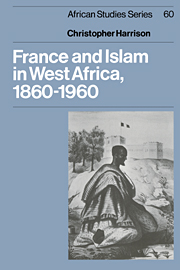Book contents
- Frontmatter
- Contents
- Acknowledgements
- Abbreviations
- Map
- 1 Introduction
- PART I 1850–1898: NINETEENTH-CENTURY ORIGINS OF FRENCH ISLAMIC POLICY
- PART II 1898–1912: THE FEAR OF ISLAM
- PART III FRENCH SCHOLARSHIP AND THE DEFINITION OF ISLAM NOIR
- PART IV 1920–1940: THE FRENCH STAKE IN ISLAM NOIR
- Introduction
- 8 Post-war attitudes to Islam
- 9 The French stake in Islam
- 10 The ‘rediscovery’ of Islam
- 11 Epilogue 1940–1960
- 12 Conclusion
- Notes
- Bibliography
- Index
11 - Epilogue 1940–1960
Published online by Cambridge University Press: 01 February 2010
- Frontmatter
- Contents
- Acknowledgements
- Abbreviations
- Map
- 1 Introduction
- PART I 1850–1898: NINETEENTH-CENTURY ORIGINS OF FRENCH ISLAMIC POLICY
- PART II 1898–1912: THE FEAR OF ISLAM
- PART III FRENCH SCHOLARSHIP AND THE DEFINITION OF ISLAM NOIR
- PART IV 1920–1940: THE FRENCH STAKE IN ISLAM NOIR
- Introduction
- 8 Post-war attitudes to Islam
- 9 The French stake in Islam
- 10 The ‘rediscovery’ of Islam
- 11 Epilogue 1940–1960
- 12 Conclusion
- Notes
- Bibliography
- Index
Summary
The last two decades of French colonial rule in West Africa witnessed rapid and dramatic constitutional changes. These changes, however, were a reflection of the turbulence of metropolitan politics and had little to do with the situation in West Africa itself.
In June 1940 metropolitan France capitulated to the German invasion forces. In North and West Africa the administrations hesitated before electing to recognise the legitimacy of the Vichy government; a decision which was motivated partly by a desire to maintain the integrity of the French Empire and partly to ensure that there would be no German invasion of the colonies. If the French Empire in north-west Africa was an Empire which ‘definitely would not strike back’, the same was not true of equatorial Africa where the Governor of Chad, Felix Eboué, the first black governor of a French colony, declared himself for de Gaulle and the exiled Free French government. The other colonies of AEF all followed suit with the exception of Gabon whose pro-Vichy administration had to be removed by force. The Allied invasion of North Africa in 1942 was the signal for a change of heart by the administration in Dakar which now declared its loyalty to the French government in Algiers.
- Type
- Chapter
- Information
- France and Islam in West Africa, 1860–1960 , pp. 194 - 201Publisher: Cambridge University PressPrint publication year: 1988

